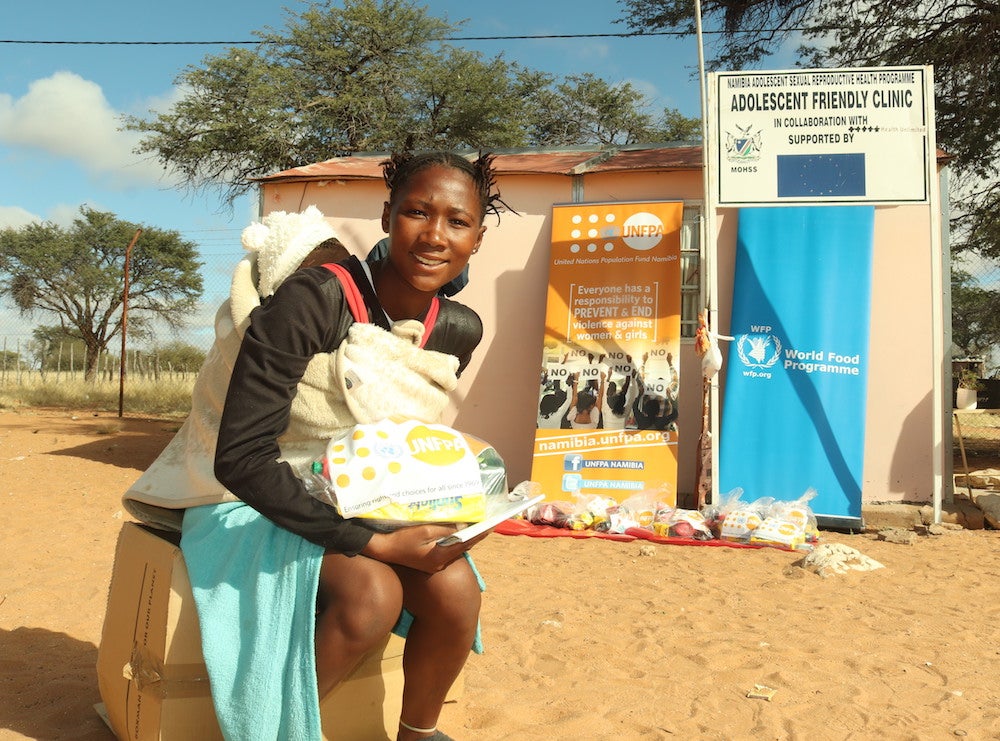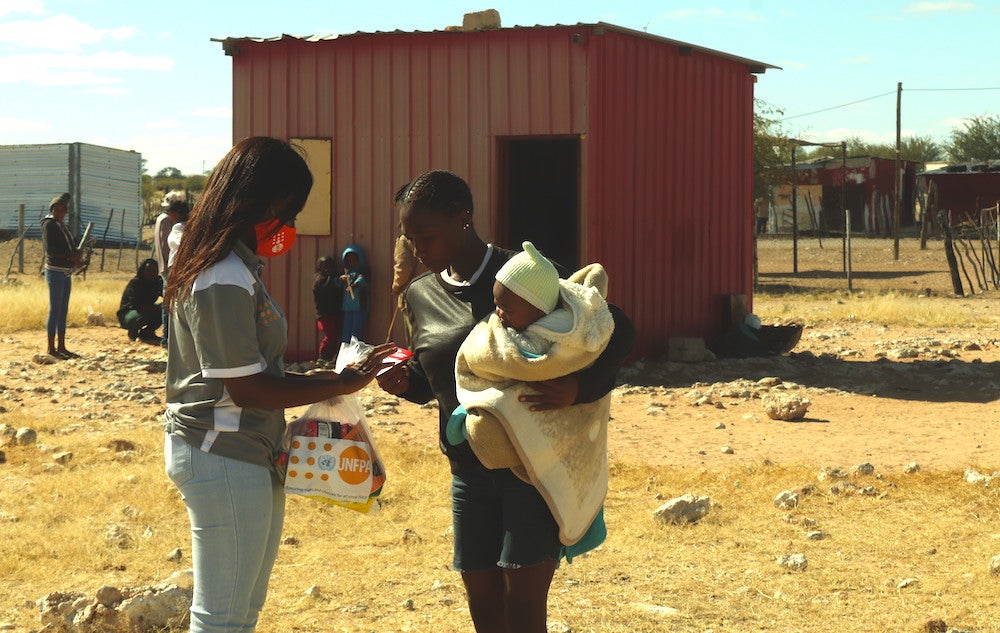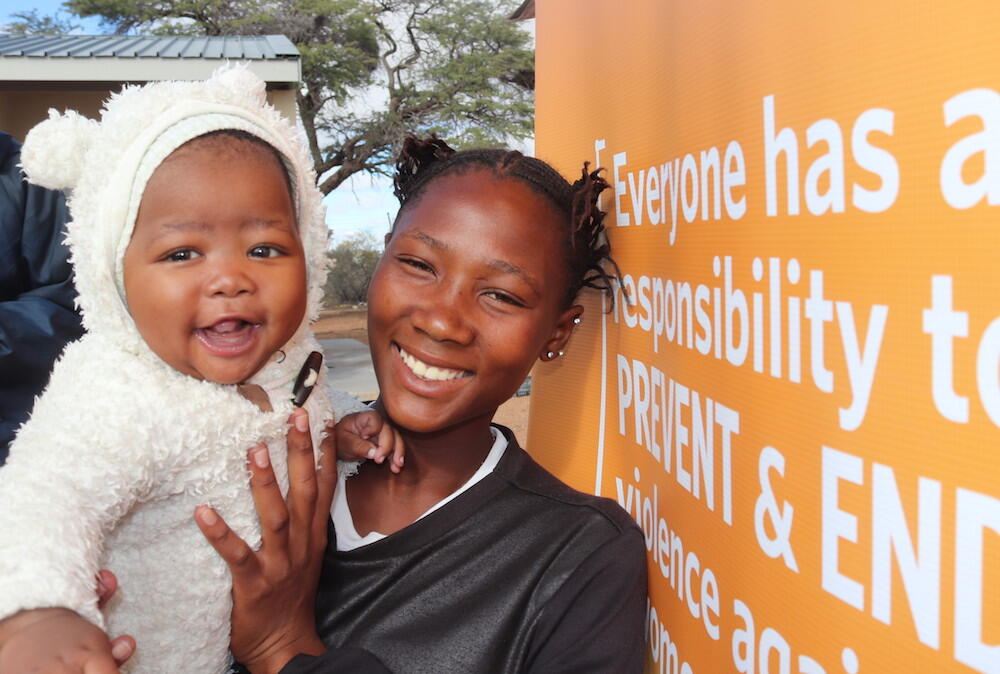GOBABIS, Namibia—Life has not been kind to Julien Konjak, 17. Since she gave birth at the age of 16, the negative response of her friends and community has been depressing for her. Her situation has been exacerbated by the country’s ongoing drought.
“All I want to do is give my baby a good life,” she says.

It is a cold winter’s morning in Onderombapa, a remote settlement more than 300km east of the capital city, Windhoek. Despite the freezing wind, Julien is inadequately dressed. “I don't have warm clothes,” she says. Her baby, at least, looks snug.
Namibia has been in the grip of the drought since last year, when President Hage Geingob declared a state of emergency and asked development partners to join the government’s response efforts.
To help the affected communities, dignity kits containing sanitary pads, soap, toiletries and washing powder have been distributed by UNFPA, the United Nations sexual and reproductive health agency. In the face of natural disasters, the sanitary supplies help women and girls maintain their hygiene.
For Julien, the assistance has come at a good time. She lives with her aunt, who is the household breadwinner, as her mother is not in good health. The family is struggling to make ends meet. “I sell traditional beer to take care of all six people living in this one-roomed kaya (home),” says her aunt, Reniece Gogoses.
I just wish I received [such information] before I gave birth.

While distributing the kits, UNFPA provided information on sexual and reproductive health, including how to prevent unplanned pregnancies and sexually transmitted infections. “I just wish I received [such information] before I gave birth," says Julien.
Her situation is not unusual. In communities beset by poverty, older men may take advantage of adolescent girls for their own sexual benefit, to the detriment of the girls. An unplanned early pregnancy can derail a girl’s education, future employment prospects and her ability to achieve her full potential.
Namibia has a young population, with two thirds below the age of 35 years. About one in five young women aged 15 to 19 years, or 19 per cent, has begun childbearing.
"Growing up, things were not easy. We were suffering a lot. We had to rely on [good] samaritans, neighbours or family members,” Julien says. Because her mother was unemployed, they did not always have money for food and she often went hungry at school. Like many adolescents, Julien planned a better life for herself – but significant challenges lay ahead.
Meeting a pubescent girl's needs
Puberty was a difficult, watershed moment for her. To meet her extra needs, she would ask her family members and peers to help with sanitary pads and cream and soap to wash herself. “But then I met a man who worked as a gardener at our school. He told me that he liked me and asked me what my needs were, and started buying me things," she says shyly.
He asked me to have sex with him and I asked him to use a condom, but he told me that there was nothing.
Her mother was aware of the developing relationship because he took them food. “One day, he asked me to visit him. He asked me to have sex with him and I asked him to use a condom, but he told me that there was nothing,” she says.
Within a few months, Julien began to feel nauseous. Her mother advised her to visit the clinic where she learned she was pregnant. “I was very sad because I wanted to finish school.”
Namibia has promulgated laws on statutory rape. It is illegal for males to engage in sexual activities with girls under the age of 16, regardless of consent. Despite this legislation, the country continues to face high prevalence of violence against girls, including rape, incest, exploitation and murder, mostly committed by intimate partners, other family members or family friends.
According to NDHS (2013), one in three adolescent girls aged 15 to 19 years has ever experienced physical or sexual violence, exposing them to the risk of unintended pregnancies and HIV infection. The adolescent pregnancy rate is high, at 19 per cent, with some regions reporting proportions of more than 36 per cent.
Anxiety of early motherhood
Once Julien had given birth, the harsh reality of parenting at a young age set in. Her child’s father refused to help her raise her baby. “When the nurses found out how old he was, they reported the matter to the police. When the police came looking for him, he ran away. Up to now, we don't know where he is,” Julien says.
I want to go back to school, to give my child a better life, and to love her unconditionally.
Despite this setback, she hopes to be able to get her plans for her future back on track. “I want to go back to school, to give my child a better life, and to love her unconditionally,” she says.
Her aunt has made sure that Julien is protected against any further unplanned pregnancies. She receives contraception from a nearby clinic. “It is so sad to see how grown men take advantage of these girls, who are so naive,” Ms. Gogoses says.
Restoring women and girls’ dignity
Globally, and in Namibia, reports have shown that in times of crisis – caused by disaster, conflict or the effects of climate change – girls face particular risks, violations and vulnerabilities just because they are girls. Girls have an especially difficult time accessing life-saving resources, information and social networks.
UNFPA in Namibia has mobilized resources to ensure life-saving gender-based violence (GBV) assistance for women and girls in the drought-affected regions. The COVID-19 pandemic has further exacerbated GBV in the country, with the Namibian police reporting a spike in GBV cases since the disease outbreak.
UNFPA distributed 3,500 dignity kits worth N$954,000 in six regions. A second batch of 6,000 kits worth N$1,428,000 is to be distributed to benefit more girls.
The Fund also donated reproductive health supplies such as oral pills, condoms and implantable contraceptives worth N$8 million to the Ministry of Health and Social Services in February, shortly before the national lockdown on 28 March.
Food items have also been distributed by the World Food Programme (WFP), complementing the government's efforts to assist vulnerable people affected by the drought.


